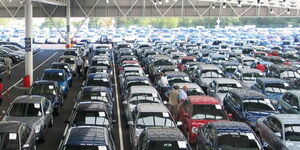The United Democratic Alliance (UDA), Communication Director, Arnold Maliba, explained the government’s rationale behind the proposal to add Value Added Tax on basic commodities such as bread and milk.
According to Maliba, the government resolved to remove the two products from the VAT-exempt list as a means to reduce the recurrent expenditure within the national budget.
Speaking during a morning show hosted by Citizen TV, Maliba opined that the government had been spending huge sums to reimburse manufacturers through tax returns for Zero-rated commodities.
“At the moment, bread and milk are zero-rated, meaning the suppliers and manufacturers normally then claim refunds on inputs they paid (for). The two products attract the highest expense in tax, which the government would reimburse,” stated Maliba.
For a “zero-rated good,” the government doesn’t tax its sale but allows credits for the value-added tax paid on inputs, which allows the manufacturers to claim reimbursements from the government.
However, If a product or business is “exempt,” the government doesn’t tax the sale of the product, but producers cannot claim a credit for the VAT they pay on inputs to produce it.
He further alluded that taxing bread and milk would ease the cost burden of shouldering the tax burden on those who do not consume the products.
According to Maliba, there are alternatives for Kenyans such as unprocessed foods like arrow roots and unprocessed milk.
Therefore Maliba opines that Kenyans can consume the alternatives without coughing up the funds for bread and processed milk after the VAT addition.
Additionally, Maliba echoed the sentiments made by Treasury Cabinet Secretary Njuguna Ndung’u which had alluded to the consumption of bread and milk being a reserve of the middle-class.
The CS had further added that the government needed to create a policy that would reimburse Kenyans and not manufacturers.
However, the proposed reimbursement of Kenyans at the point of purchase of the products has not been implemented.
Consequently, Kenyans will therefore purchase bread at a higher cost without any form of reimbursement of the VAT added
Additionally, a spot-check by Kenyans.co.ke on the cost of the proposed alternatives which include arrow roots and sweet potatoes revealed that they were costlier than a loaf of bread.
In Nairobi, a bunch of three arrow roots which may not be enough to feed a family of four costs upwards of Ksh150.












